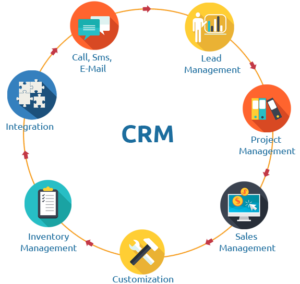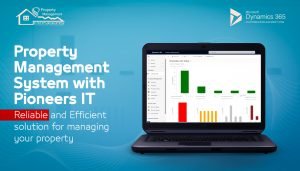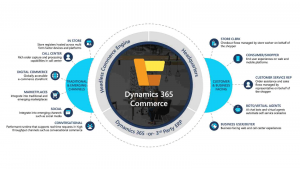Which are Dynamics 365 Customer Engagement and Effective roles in companies?
What are Microsoft dynamics 365 CRM?

Microsoft Dynamics 365 CRM (Customer Relationship Management) is a cloud-based software solution that helps businesses manage their customer interactions and relationships. The platform provides a range of tools and features to help businesses automate and streamline their sales, marketing, and customer service processes.
Dynamics 365 CRM is built on the Microsoft Dynamics platform, which means it can integrate with other Microsoft products such as Office 365, Power BI, and Outlook. This allows businesses to easily access and share customer data across different departments and teams.
The sales module of Dynamics 365 CRM helps businesses automate and manage their sales processes, from lead generation to closing deals. It includes features such as lead management, opportunity management, and account management. The marketing module includes features such as campaign management, lead scoring, and marketing automation. The customer service module includes features such as case management, knowledge management, and service scheduling.
Dynamics 365 CRM also includes a range of analytics and reporting tools that allow businesses to gain insights into their customer data and make data-driven decisions. The platform also includes a mobile app that allows users to access customer information and perform tasks on the go.
Dynamics 365 CRM is a flexible and customizable solution that can be tailored to meet the specific needs of different businesses. It can be used by small businesses, as well as large enterprises, and it can be integrated with other business systems and applications.
Overall, Dynamics 365 CRM is a comprehensive solution that helps businesses improve their customer interactions, streamline their processes, and gain valuable insights into their customer data. It can help businesses to increase their productivity, improve their customer service, and ultimately drive more revenue.
What is Dynamics 365 CRM used for?
Dynamics 365 CRM (Customer Relationship Management) is a cloud-based software solution that helps businesses manage their customer interactions and relationships. The platform is primarily used for automating and streamlining sales, marketing, and customer service processes, with a focus on improving customer engagement and driving revenue growth.
Dynamics 365 CRM includes a range of tools and features for sales management, such as lead management, opportunity management, and account management. These tools can help businesses automate repetitive tasks and streamline their sales process, allowing them to focus on high-value activities. Additionally, the marketing module includes features such as campaign management, lead scoring, and marketing automation, which can help businesses target and engage with their customers more effectively.
Dynamics 365 CRM also includes a customer service module, which provides features such as case management, knowledge management, and service schedule.
These tools can help businesses improve their customer service and support, which can lead to increased customer satisfaction and loyalty.
The platform also includes analytics and reporting tools, which allow businesses to gain valuable insights into their customer data. This data can then be used to make data-driven decisions, improve customer engagement, and ultimately drive revenue growth.
Overall, Dynamics 365 CRM is a comprehensive solution that can help businesses to automate and streamline their sales, marketing, and customer service processes, while also providing valuable insights into customer data. It can be used by small businesses and large enterprises, and it can be integrated with other business systems and applications.
Does Microsoft Dynamics 365 include CRM?
Microsoft Dynamics 365 includes a CRM (Customer Relationship Management) solution as one of its core modules. Dynamics 365 CRM is cloud-based software that helps businesses manage their customer interactions and relationships. It provides a range of tools and features for automating and streamlining sales, marketing, and customer service processes, with a focus on improving customer engagement and driving revenue growth.
Dynamics 365 CRM includes a sales module, which provides tools for lead management, opportunity management, and account management. It also includes a marketing module, which provides features such as campaign management, lead scoring, and marketing automation. Additionally, Dynamics 365 CRM includes a customer service module, which provides features such as case management, knowledge management, and service schedule.
The Dynamics 365 platform also offers a range of other modules, such as Dynamics 365 for Finance and Operations, Dynamics 365 for Talent, Dynamics 365 for Retail and Dynamics 365 for Project Service Automation. These modules can be used in conjunction with the CRM module to provide a full range of business solutions.
Overall, Microsoft Dynamics 365 is a comprehensive business solution that includes a CRM module, as well as a range of other modules that can help businesses automate and streamline their processes, improve customer engagement, and drive revenue growth. The platform can be tailored to meet the specific needs of different businesses, and it can be integrated with other business systems and applications.
Which are the benefits of Microsoft Dynamics 365 CRM?
Microsoft Dynamics 365 CRM (Customer Relationship Management) offers a range of benefits to businesses of all sizes. Some of the key benefits include:
 Improved customer engagement: Dynamics 365 CRM provides a range of tools and features that help businesses engage with their customers more effectively. This can lead to increased customer satisfaction and loyalty, which can ultimately drive revenue growth.
Improved customer engagement: Dynamics 365 CRM provides a range of tools and features that help businesses engage with their customers more effectively. This can lead to increased customer satisfaction and loyalty, which can ultimately drive revenue growth.- Streamlined processes: Dynamics 365 CRM can help businesses automate and streamline their sales, marketing, and customer service processes. This can increase productivity, reduce errors, and free up time for high-value activities.
- Insights into customer data: Dynamics 365 CRM includes analytics and reporting tools that allow businesses to gain valuable insights into their customer data. This data can then be used to make data-driven decisions, improve customer engagement, and ultimately drive revenue growth.
- Increased mobility: Dynamics 365 CRM includes a mobile app that allows users to access customer information and perform tasks on the go. This increases the flexibility of the platform and allows users to work more efficiently.
- Integration with other Microsoft products: Dynamics 365 CRM is built on the Microsoft Dynamics platform, which means it can integrate with other Microsoft products such as Office 365, Power BI, and Outlook. This allows businesses to easily access and share customer data across different departments and teams.
- Scalability: Dynamics 365 CRM is a flexible and customizable solution that can be tailored to meet the specific needs of different businesses. It can be used by small businesses, as well as large enterprises, and it can be integrated with other business systems and applications.
Overall, Dynamics 365 CRM is a comprehensive solution that can help businesses improve their customer interactions, streamline their processes, and gain valuable insights into their customer data. It can help businesses to increase their productivity, improve their customer service, and ultimately drive more revenue.
Conclusion
In conclusion, Microsoft Dynamics 365 CRM is a comprehensive solution that helps businesses manage their customer interactions and relationships. It is a cloud-based software that provides a range of tools and features that help businesses automate and streamline their sales, marketing, and customer service processes. The platform is built on the Microsoft Dynamics platform, which means it can integrate with other Microsoft products such as Office 365, Power BI, and Outlook, allowing businesses to easily access and share customer data across different departments and teams.
Dynamics 365 CRM offers a range of benefits to businesses, such as improved customer engagement, streamlined processes, insights into customer data, increased mobility, integration with other Microsoft products, and scalability. It can be used by small businesses and large enterprises, and it can be tailored to meet the specific needs of different businesses.









